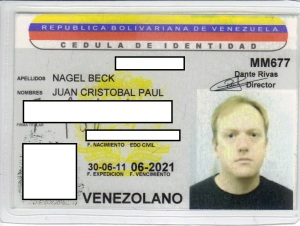The litmus test
 “If he can make getting a cédula easier, then I will consider supporting him.”
“If he can make getting a cédula easier, then I will consider supporting him.”
I remember thinking and saying this back in 1999, when Hugo Chávez was first elected.
The experience of my previous two cédulas, Venezuela’s indispensable ID cards, had been traumatic for me. I am ashamed to admit that both of my trips to the DIEX involved bribes, cutting in line, and influence peddling. The degrading experience left me with a lifelong distaste for immigration bureaucrats everywhere.
As all of you probably know, getting your ID card required confronting the beast that is Venezuelan inefficiency and corruption at its absolute worst, and realizing that the beast always wins. So simplifying the process became a kind of litmus test for me.
Way back when there was still a chance that he was some kind of third-way Lula and not a retrograde communist, I naively pledged that, if Chávez could somehow, some way, make it easier for me to obtain my ID, I would seriously consider being a supporter.
A few weeks ago, I got the chance to try it for the first time.
My last cédula expired in 2007, and I decided in this trip that I had to get a new one. My relatives quickly informed me that this procedure was now a piece of cake, thanks to Misión Identidad.
They told me we had to go to an Operativo, a mobile, quasi-permanent ID-issuing operation. The only one people knew about was deep in the heart of San Francisco Municipality, past the Monument to the Crashed Car.
We drove for about an hour, following minute instructions someone had given us, hush-hush. Turn right at the Hardware Store, turn left at the Mormon church, and you’ll be there, we were told. I had no idea Maracaibo, my home town, was so big.
The Operativo is held at a public school, in a building that looks like it was abandoned but that I’m pretty sure is still operational. Curiously, one of the buildings in the complex has both air conditioning and a caved-in roof. I didn’t see any students, but I knew better than to ask what the place actually was. Thankfully, the waiting area was a covered gymnasium so the vaunted “beloved sun” was not an issue.
I waited in line for ten minutes, with thirty people ahead of me. Pretty soon, we were all ushered into a small air-conditioned room. The smell of Lavan-San permeated the air. Six people with laptops were seated at a table at the end of the room, and they told us to form six lines.
After about three minutes, I gave the lady a color photocopy of my old cédula. She asked me for my phone number. She typed it in, then asked me to pose for a picture and to provide the capta-huella with my fingerprint. Yes, I was a capta-huella virgin until that day.
I was then told to go to the table at the other end of the room. After three minutes, give or take, my name was called and I was asked to sign a piece of paper. I was told to wait outside, in the covered gym, until my card was ready.
Five minutes later, the guy comes out and my name is called. I am handed what is essentially a color printout on a beige piece of paper, with my name, picture, signature, and fingerprint. The piece of paper had been cut with a paper cutter, and plastified using regular old plastic. The only thing making it look semi-official was the barely-there seal of the Bolivarian Republic in the middle.
That was it. That was my cédula. The whole process took fifteen minutes. Hugo Chávez had passed my litmus test.
Teodoro Petkoff has famously argued that Misión Identidad is, quite possibly, the government’s most successful social program. He says that the process of being illegal and not having an ID card in a country obsessed with the darn thing was degrading for thousands of Venezuelans and millions of hard-working immigrants. It forced many of us to live in the shadows and forsake our time, money, and principles in order to formalize our existence.
Now, it’s quite simple. You can get a cédula very quickly. In fact, you can get many cédulas very quickly. My relatives, after all, decided to come with me to get new ones for themselves, in case their old ones got lost. My brother-in-law has five.
Sure, the government has made the process simple and accessible largely by debasing the identity the cédula is meant to vouch for.
There are absolutely no privacy safeguards involved. The technology of modern ID cards has bypassed them completely, making the final product cartoonishly easy to fake. Since the government didn’t have my fingerprint on record, the only way they could verify that I was in fact who I claimed to be was the photocopy of my previous cédula, the 14-year old picture on the paper that sort of looked like me being the only proof that I was, in fact, who I claimed I was.
Chavismo has made getting a cédula simple and easy by making the cédulas themselves a joke. Our identities mean nothing, and our privacy is meaningless.
Sure, Chávez sort of passed my litmus test. But this is far from what I had in mind.
Caracas Chronicles is 100% reader-supported.
We’ve been able to hang on for 22 years in one of the craziest media landscapes in the world. We’ve seen different media outlets in Venezuela (and abroad) closing shop, something we’re looking to avoid at all costs. Your collaboration goes a long way in helping us weather the storm.
Donate




